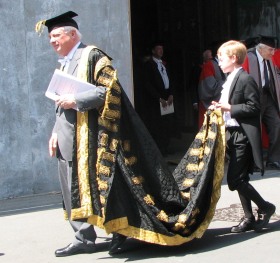♠ Posted by Emmanuel in
China,
Economic History,
India
at 12/11/2012 08:29:00 AM
Though not always, expatriates often develop piercing insights into the often strange political economy of Asian nations as outsiders looking in. Lord Christopher Patten of Barnes should be familiar to all scholars of Asia as the last British governor of Hong Kong. He remains controversial to this day for, in so many words, attempting to enshrine democratic processes in the colony prior to the 1997 handover. Jaded Hong Kong residents even grew a fondness for him--well, at least outside the business community--for his instincts as a retail politician did not go away when
appointed for the post. From Andrew Craig-Bennett's superb and much-recommended history of Hong Kong where he traces the backhanded nickname of endearment "
Fat Pang":
Patten continued to behave differently to his predecessors; although,
unlike his predecesors for many generations, he did not speak either
Mandarin or Cantonese, he used to go for informal strolls in the
streets, chatting to people and pressing the flesh. In fact, he was behaving like the seasoned democratic politician that he actually was. Trouble was, Hong Kong had never seen such an animal before. As my Taipan remarked, "When will he stop kissing babies in Mong Kok? Doesn't he realise he doesn't have to get elected in this job?"
Patten
also used to make political speeches at the drop of a hat - no mere
cutter of ribbons with a few kind words, like earlier Governors, he
would deliver a twenty minute oration and - people listened. He
became the first and last Governor to acquire a Chinese nickname - Fat
Pang - 肥彭 (Chinese nicknames were sought after amongst the gweilo
[foreign] community because they were only bestowed (behind your back) if you
deserved one, for good or ill, and it was usually very hard to find out
what yours was.)
So it is that he retained that Tory British predilection of adopting strong democratic stances as governor when his country of course used to be the world's foremost imperialist and slaver. Needless to say, attempting to instil democracy in a colony that would soon be handed over to China did not go so well with the PRC. What's more, his actions have undoubtedly caused ongoing headaches for the Chinese leadership insofar as several opposition parties now responsible for organizing mass protests against the mainland and so forth sharpened their teeth during Patten's epoch-ending stint:
Legco [legislative committee--which retains its role post-handover] debates became very different; long diligently televised,
they started to be watched. The subject of debate moved away from the
usual municipal trivia and started to take on a broader view. Patten
was a veteran of the House of Commons; Hong Kong's political class
watched and learned.
The first group to take a serious dislike
to Fat Pang was the business community. Legco was not meant to be a
debating chamber; it was meant to be a rubber stamp for [commercially friendly] decisions
arrived at over lunch.
All this political activity had an effect which I must assume
(since he is still active in politics, and has not settled down to
write his memoirs yet) Patten intended it to have. Hong Kong developed political parties. Strictly
speaking, there had been parties since soon after WW2, but with one
exception they were informal and had little influence.
Very interesting stuff. In line with this bit of Patten-era Hong Kong history, RBS has an unsurprisingly rollicking
interview with the man himself on the so-called Asian Century. To no one's real surprise given his advocacy as Hong Kong governor, he believes that how far the likes of China and India will go depends on the extent they internalize democratic values (especially China):
Yet Chinese consumption remains low as a proportion of GDP, as does
domestic investment. If China is to make its growth sustainable, it must
change its model from investment in low-cost manufacturing to
investment in the domestic economy and personal consumption. This will
mean offering more social entitlement programmes and investing more in
education and health. Sustainable growth also requires political reform, an area in which
the Chinese leadership has had to tread carefully. “The Chinese often
claim that they can do things to the economy without having an effect on
politics,” says Lord Patten. “I rather doubt that myself and so,
clearly, do some Chinese leaders.”
Like me, he believes that prospects of Chinese global preponderance are wide of the mark:
Next year will see a change in China’s political guard. Xi Jinping is
expected to take over the presidency from Hu Jintao, but comparatively
little is known about the likely new leader’s agenda. There is an
ongoing debate within China between the party hardliners and some of the
modernisers.
“The hardliners’ argument is that if the party continues to allow the
privatisation of state and enterprises, along with more foreign direct
investment, it will sooner or later lose control over the state,”
explains Lord Patten. “The modernisers say that unless they continue to
stand back from the state and enterprises, and encourage the private
sector, the economy won’t grow quite so fast and won’t create so many
jobs, which would result in the party losing control. I think the
Chinese dilemma is that both those propositions are correct.”
In light of these challenges, he questions the claim that the 21st
century belongs to China. “It’s certainly the case that America and
Europe won’t dominate the global agenda in the next few years in the way
they have in the past century,” he says. “But I don’t think that we’re
going to live in a Chinese century. It may be one in which the Chinese
and Indians, like the Japanese, refuse to define modernity in entirely
western terms, but I don’t believe that we’ve seen the end of western
influence.”
Good stuff; and he's probably on target.


